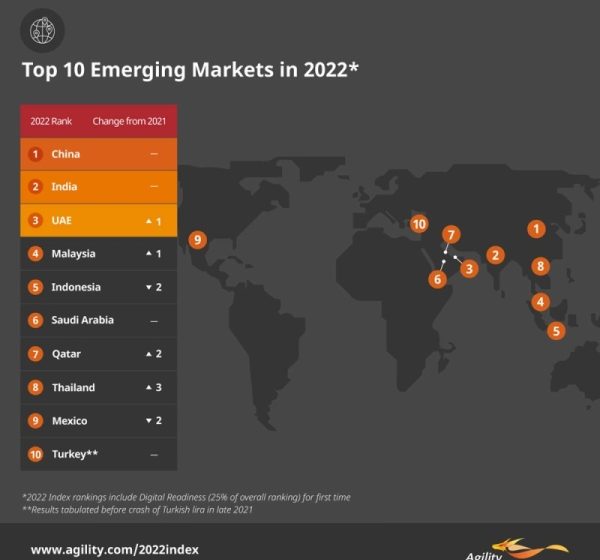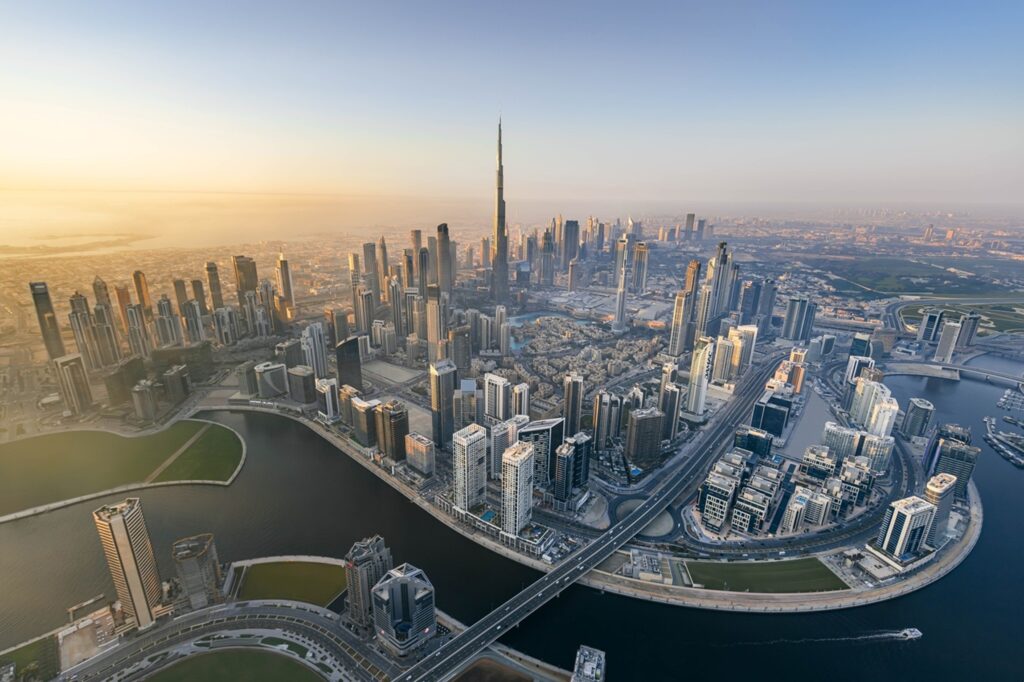
UAE Ranked Third Globally In Agility Emerging Markets Logistics Index
The United Arab Emirates (UAE) has been ranked first in the MENA region and third globally for its performance in both the business fundamentals and digital readiness categories in the Agility Emerging Markets Logistics (AEML) Index.
The Emirates combined these significant strengths with top five rankings in both domestic and international logistics opportunities, the logistics company Agility said in a survey conducted on 756 supply chain industry professionals.
Only China and India are ahead of Emirates in the rankings and are in the first and second places respectively. Besides the UAE, Saudi Arabia and Qatar secured sixth and seventh places among the top 10 countries out of 50 in the AEML index for the year 2022.
Agility’s Chief Executive Tarek Sultan said: “The connection between a country’s digital capabilities and growth prospects is undeniable.”
He further said: “The competitiveness of emerging markets countries will be determined by their ability to develop digitally-skilled businesses and talent pools and find the resolve to lower their emissions in ways that spur growth rather than sacrificing it.”
By topping the business fundamental ranking over four consecutive years, the UAE continues to develop the strength of its business environment to further enhance its attractiveness to foreign investors and local operators alike.
“During 2020, investment into the UAE rose 44% to a total of $20 billion, despite the global effects of the pandemic. Last year, the UAE made further changes to its legislative environment in part to spur such investment activity still higher,” the survey said.
This included a series of more than 40 amendments that simplify and widen the scope of economic, investment and commercial structures for businesses operating in the Emirates.
The amendments make it possible to create companies for M&A activity, allow branches of foreign firms to convert into domestic businesses and eliminate the requirement that the majority of a company’s directors be UAE nationals. Trademark and intellectual property protections were also strengthened.
Tare Sultan also said the industry’s optimism reflected the fact that emerging economies were getting more resilient and figuring out ways to weather supply chain disruption. “If emerging markets can get better access to vaccines and give small businesses a boost, they can help power a broad, dynamic global recovery,” he added.
Social Reforms
There were also social reforms in 2021 aimed at boosting the attractiveness of the UAE’s labour market. These included changes to the Emirates’ working week which was brought in line with Europe, North America and Asia Pacific and the extension of working visas for skilled employees across a range of sectors.
In sum, the reforms enhanced the UAE’s already adaptable policy frameworks and build on a strength that has seen it develop into the second-largest Arab economy.
Besides legislative reforms, the UAE has also announced plans in 2021 to increase the size of its manufacturing sector. These plans aim to spur the development of heavy and light manufacturing across the plastics, metals, energy, life sciences, petrochemicals and green fuels sectors. This includes the development of a bio pharma campus that will see Abu Dhabi’s sovereign wealth fund partner with AI Company G42.
The plans will see the campus undertake the end-to-end manufacturing of advanced biologics therapies and position the UAE at the centre of regional life sciences supply chains.
The project is part of the Emirates’ wider diversification efforts, in which it aims to utilise advanced technologies to more than double the GDP contribution of its manufacturing sector by 2030. Under the plans, the Emirates Development Bank and Abu Dhabi Ports Group have also partnered to provide financing to companies operating in industrial cities and free zones, the report explained.
Saudi’s Growth
Saudi Arabia ranked 6th in the AEML index ranking following a year of heightened oil demand and rising hydrocarbon prices that provided a boost to its economic growth. According to International Monetary Fund (IMF) data, Saudi Arabia’s economy is the largest amongst the GCC nations and expanded 2.9% in 2021, following a contraction of 4.1% in a pandemic disrupted 2020. The headline expansion was part of a set of healthy macroeconomic data recorded throughout the year.
Qatar ranks 7th overall in the 2022 Agility Emerging Markets Logistics Index. The Gulf state recovered quickly from the impacts of the COVID-19 pandemic, as a combination of stimulus spending and a broad-based recovery across its economy took hold.















